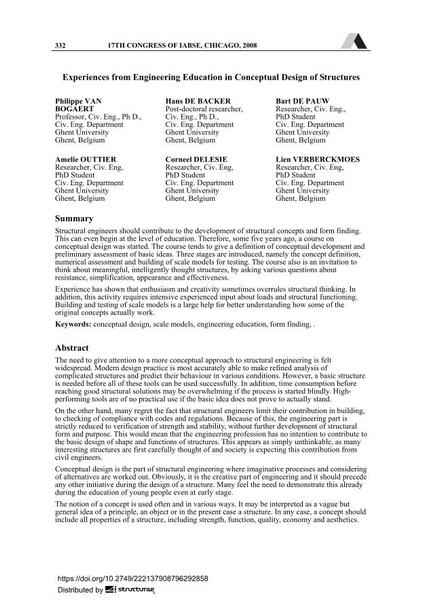Experiences from Engineering Education in Conceptual Design of Structures

|
|
|||||||||||
Bibliographic Details
| Author(s): |
Philippe Van Bogaert
Hans De Backer Bart De Pauw Amelie Outtier Corneel Delesie Lien Verberckmoes |
||||
|---|---|---|---|---|---|
| Medium: | conference paper | ||||
| Language(s): | English | ||||
| Conference: | 17th IABSE Congress: Creating and Renewing Urban Structures – Tall Buildings, Bridges and Infrastructure, Chicago, USA, 17-19 September 2008 | ||||
| Published in: | IABSE Congress Chicago 2008 | ||||
|
|||||
| Page(s): | 332-333 | ||||
| Total no. of pages: | 7 | ||||
| Year: | 2008 | ||||
| DOI: | 10.2749/222137908796292858 | ||||
| Abstract: |
Structural engineers should contribute to the development of structural concepts and form finding. This can even begin at the level of education. Therefore, some five years ago, a course on conceptual design was started. The course tends to give a definition of conceptual development and preliminary assessment of basic ideas. Three stages are introduced, namely the concept definition, numerical assessment and building of scale models for testing. The course also is an invitation to think about meaningful, intelligently thought structures, by asking various questions about resistance, simplification, appearance and effectiveness. Experience has shown that enthusiasm and creativity sometimes overrules structural thinking. In addition, this activity requires intensive experienced input about loads and structural functioning. Building and testing of scale models is a large help for better understanding how some of the original concepts actually work. |
||||
| Keywords: |
conceptual design form finding Engineering Education scale models
|
||||
